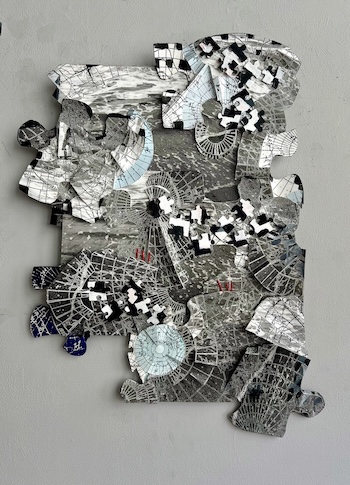By Lauren Kaufmann
Phyllis Ewen ponders humanity’s perilous relationship with the earth, expressing her concerns through her artwork.
Phyllis Ewen: Inundation, Kingston Gallery, 450 Harrison Ave., Boston, through June 1.

Phyllis Ewen, Intertidal. Photo: courtesy of the artist
Phyllis Ewen is deeply concerned about the effects of climate change and channels this anxiety into compelling visual statements through her artwork. Her intricate designs blend weather maps, charts, and photographs into an interconnected network of swirling lines, grids, and puzzle-like fragments that evoke the instability and complexity of our changing climate.
There’s a sense of movement in Ewen’s work; repetitive patterns appear as breaking waves or eddying pools of water. There are recurrent circular motifs, perhaps evoking the eye of one of the many storms that are wreaking havoc with our environment.
Ewen’s current show, Inundation, hangs on the walls of Kingston Gallery in Boston’s South End. She has produced a series of what she calls sculptural drawings — 3-dimensional reliefs made up of layered paper. Her pieces are amalgamations of images that she scans and alters in Photoshop. Then she layers the images to create impressions of the earth’s surface. Her pieces have organic shapes with jagged edges, sometimes cut out to resemble jigsaw puzzle pieces, creating a feeling of being unfinished, or seeking resolution.
Ewen’s incomplete edges speak to the unraveling of the environment. As the Trump administration halts research on climate change, withdraws from the Paris climate agreement, and shutters much of the National Oceanic and Atmospheric Administration, the collective anxiety generated by these alarming decisions continues to accelerate. For many years, there have been tangible signs of the effects of climate change — rising temperatures, sea level rise, drought, flooding, and increased hunger and disease. Ewen ponders humanity’s perilous relationship with the earth, expressing her concerns through her artwork.
In most of these pieces, Ewen’s palette draws primarily on black and gray, with occasional splashes of blue. A couple of the pieces, including Moving Water, Intertidal, and Shoreline contain red acupuncture needles. Ewen said that she inserted these as a way to place herself directly into the work.
In her series titled Urban Floods, made up of five separate pieces, Ewen employs a grittier color scheme. There are no flashes of blue in these works; they are charcoal gray and mustard yellow. The earthier palette seems appropriate for the subject matter.

Phyllis Ewen, Urban Floods. Photo: courtesy of the artist
Viewers may read Ewen’s pieces as if looking down on a topographical map, although Ewen says that she hopes viewers will be drawn into the work as if we are plopped down in the middle of her imagined landscapes. Regardless of your perspective, these works, which Ewen calls ‘imagined coastal images,’ stir up feelings about the complexity of the land and sea that make up our fragile ecosystem.
It seems particularly fitting that this exhibit is on view in the South End, a stone’s throw from Boston Harbor. Climate change has caused a significant rise in ocean levels in the harbor—10 inches in the last 100 years, and scientists predict that we will see another two to four feet of sea level rise in the next 75 years. In consideration of the theme of Ewen’s exhibit, Kingston Gallery has invited filmmaker David Abel into the gallery to preview his documentary film, Inundation District. The movie explores how Boston developers and politicians decided to develop the Seaport despite warning signs that climate change would likely cause devastating damage to the area.
On May 17 at 2 p.m., Kingston Gallery will present a talk with Ewen, David Abel, and climate scientist Robert DeConto, Director of the School of Earth and Sustainability at UMass Amherst. This one-hour program is free and open to the public. To register, go here.
Lauren Kaufmann has worked in the museum field for the past 14 years and has curated a number of exhibitions. She served as guest curator for Moving Water: From Ancient Innovations to Modern Challenges, currently on view at the Metropolitan Waterworks Museum in Boston.
